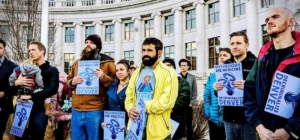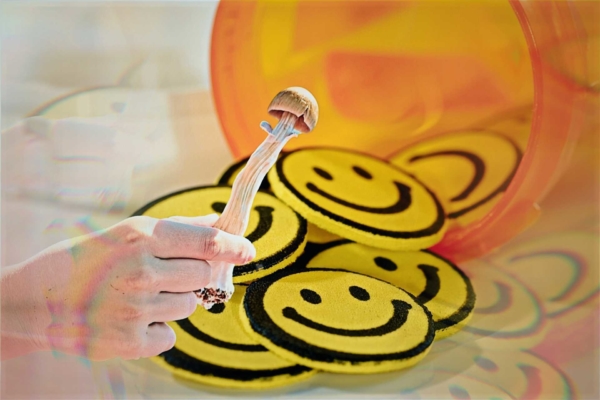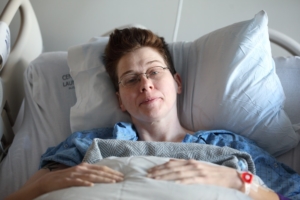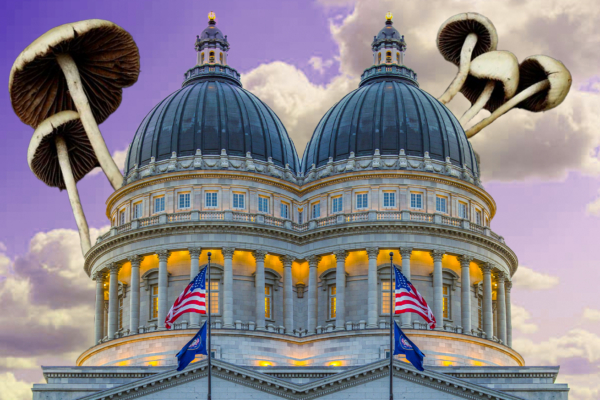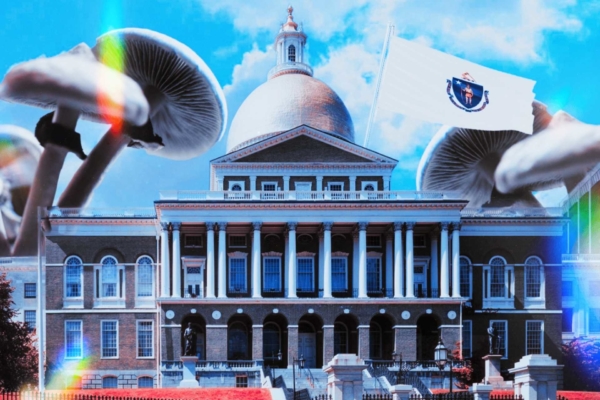
Psychedelic research has been rapidly expanding throughout the year, and additional trials investigating the potential of these substances to improve mental health may begin soon. Clerkenwell Health, a UK-based start-up, seeks volunteers for its experimental treatment.
In other news, despite support from both Republicans and Democrats, amendments that aimed to expand psychedelic access for military veterans and fund research have been rejected by a GOP-led committee.
An increasing number of American couples are turning to psychedelics to deepen their understanding of each other and address their issues, supported by a growing network of practitioners providing these treatments.
Texas Doctors to explore psychedelic-assisted psychotherapy for gynecologic cancer patients
Last Tuesday, a group of Texas doctors published a paper that examines how psilocybin-assisted psychotherapy could help relieve the uncertainty and crushing grief women in treatment for gynecologic cancer face, especially during the late stages of the disease. The researchers collected data from 10 clinical trials that found that one or two doses of psilocybin provide quick, long-lasting antidepressant effects lasting up to 6 months.
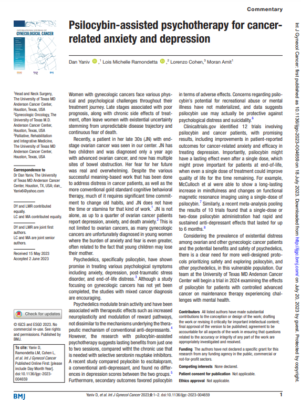
While cognitive-behavioral therapy can address the distress of cancer patients, it demands a level of commitment and stamina that they often lack. Psychedelics could provide a quicker route toward relief, helping the patients work through their negative emotions.
Since cancer treatment has advanced quickly in recent years, a cohort of patients with advanced cancer has emerged, but most cannot cope with the fact that they may die unexpectedly. If psychedelics could alleviate this existential dread, they could better enjoy their remaining life.
The authors intend to conduct a trial to explore this possibility in 2024. Despite its conservative majority, they hope to receive approval from the Texan legislature, which is surprisingly open to psychedelic research.
Bipartisan push for psychedelics and marijuana amendments to DOD bill stopped by committee
Following our hopeful coverage two weeks ago, the bipartisan push to amend a large-scale defense bill to include marijuana and psychedelics policy reforms has been virtually shut down. A GOP-controlled committee prevented the proposed amendments from getting floor votes and received backlash from both parties shortly after.
The co-chairs of the Congressional Cannabis Caucus, who are both Democrats, called the blockage “a travesty.” At the same time, Rep. Matt Gaetz (R-FL) reiterated his disdain for Congress’ gerontocracy, which has “a boomerfied view of drug policy.”
The proposed psychedelic amendments included facilitating MDMA-assisted therapy for veterans, granting the DEA the power to reschedule psilocybin and MDMA to Schedule 2 of the Controlled Substances Act, and promoting research into cannabis and psychedelics for therapeutic purposes.
One amendment was attached to the bill’s base text, proposed by Rep. Morgan Luttrell (R-TX), creating a grant program by the Department of Defense (DOD) to support research on the potential therapeutic benefits of psychedelics in treating post-traumatic stress disorder (PTSD) and traumatic brain injury (TBI).
Dan Crenshaw (R-TX) expressed concern over the House Armed Services Committee staff weakening the said amendment by modifying its language without authorization. The changes eliminated funding for the research and changed its requirement of clinical studies to clinical trials.
He proposed to change this amendment, but its fate is uncertain given these new developments. The struggle to increase access to psychedelics continues within Congress and among advocates on the streets, and although it sometimes seems like an uphill battle, it’s one worth fighting.
UK will explore innovative psychedelic psychotherapy methods for mental health disorders and call for volunteers
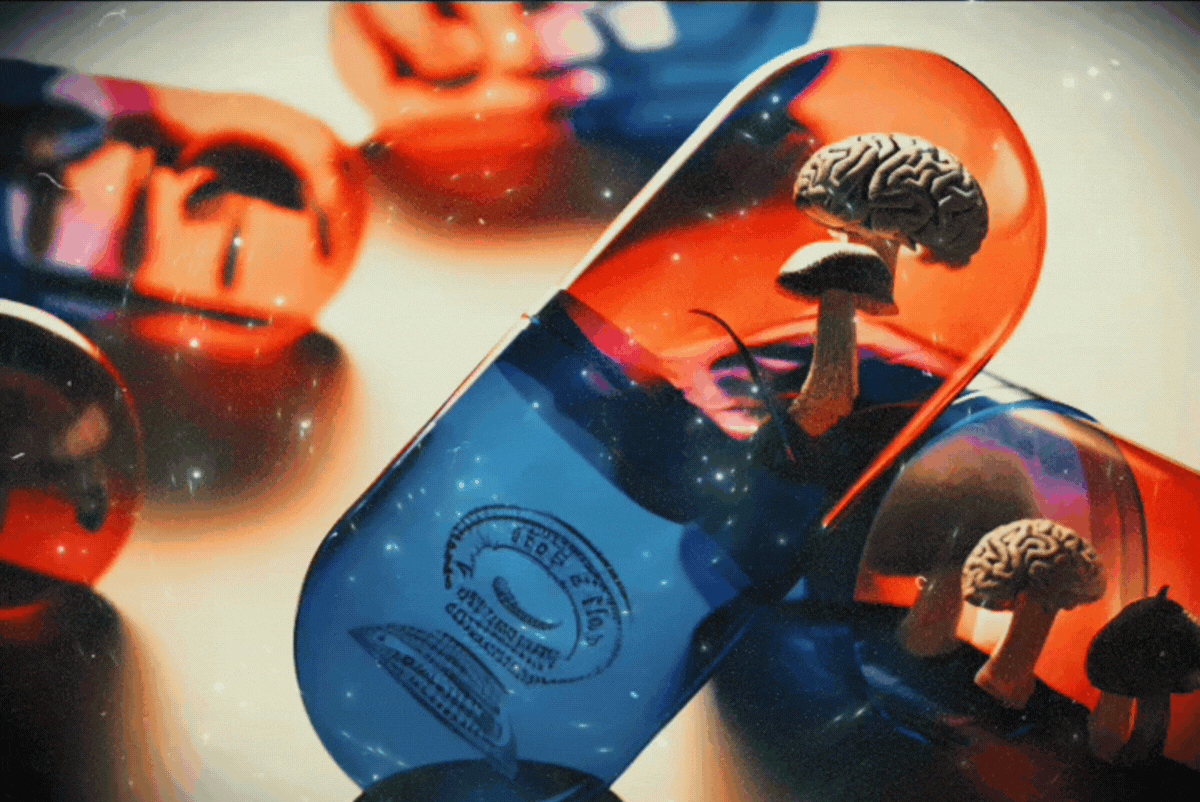
UK-based start-up Clerkenwell Health is designing clinical trials that will combine psychedelic substances with specialized therapy to find out if this method can alleviate the symptoms of patients with anxiety, alcohol use disorder, and PTSD. To this end, it has issued a national call for volunteers willing to participate in these trials.
The company is aware of the rising number of patients on antidepressants in England and seeks to help reduce it. Additionally, they are conscious of the National Health Services (NHS)’s limitations when treating patients with specific diagnoses and aim to create alternative forms of treatment.
Clerkenwell Health’s trials will combine in-house developed therapist techniques with psilocybin doses. If the tests succeed, their introduction to the health system would also bring a more cost-effective solution than traditional therapy.
The trials are expected to kick off later this year, and UK readers can sign up as volunteers through this link.
Study investigates the emotional experiences of antidepressant users and psilocybin users
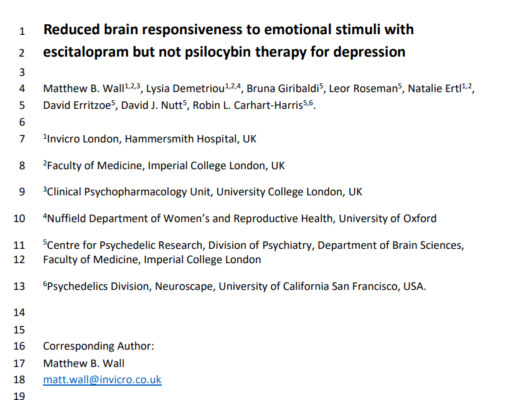
2 escitalopram but not psilocybin therapy for depression
A recent study pitted escitalopram, a common selective serotonin reuptake inhibitor ( SSRI), against psilocybin to examine how each substance makes depressive patients process their emotions after consumption. Psychedelics seem able to treat depression without causing the ’emotional blunting’ that SSRIs can induce, leading users to have subdued emotional experiences, whether positive or negative.
The researchers conducted a trial to examine how the brain responds to emotional faces for psilocybin users and escitalopram users. Using brain imaging technology, researchers could observe the specific regions of the brain that lit up when participants were shown faces with fearful, happy, and neutral expressions. They scanned the participants’ brains before the therapeutic intervention, six weeks after the first dosing day, and one day after the trial ended.
The results showed that the escitalopram users’ brains became less responsive to emotions, and the brains of psilocybin users either remained the same or became more responsive to feelings.
Escitalopram users who experienced more intense emotional blunting had a more significant reduction in their depressive symptoms, while psilocybin users with higher dynamic function showed improvement in their depressive symptoms.
Both treatments differ significantly in how they affect the patients’ brains and emotions, but psychedelics show promise in having longer-lasting, more transformative effects on their users.
Read also: New Paper Explores How People Process Emotions on Antidepressants vs. Psilocybin.
US couples are using psychedelic psychotherapy to strengthen their bond
VICE News interviewed a couple who have started using psychedelics to work through their issues and practitioners—both underground and above-ground—who are providing these treatments to many couples in America.
Isabel and Joseph are two married British Columbian physicians in a 15-year-long relationship. They don’t use drugs regularly but started psychedelics after a profound trip at the Burning Man festival.
Since then, hiring a babysitter for their two children, renting a room at a resort, and taking psychedelics to solve long-standing conflicts and deepen their understanding of each other has become a yearly tradition. Due to their professional background, they usually trip on their own. They have also had guided trips with one of these underground therapists.
The reporter interviewed Jayne Gumpel, a New York-based clinical social worker who has treated around 150 couples using ketamine, and Dr. Reid Robison, who is a chief clinical officer at a mental health care company, and also provides ketamine-assisted couples therapy.
Both professionals acknowledged there is an increasing demand for couples psychedelic therapy while recognizing its limitations. They emphasized that successful treatments require both participants to be receptive to change and eager to empathize with their partner. Successful treatments can save marriages, reignite sex lives, and help divorced couples overcome old grudges when they must co-parent.

